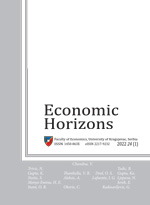EFFECTS OF STRUCTURAL CHANGES IN THE ECONOMY OF THE REPUBLIC OF SERBIA: OLD PROBLEMS, NEW REFORM CHALLENGES
Edvard Jakopin
Faculty of Economics and Finance, Union University Nikola Tesla, Belgrade, The Republic of Serbia
Structural changes in the economy directly affect macroeconomic and financial stability, income growth, productivity and economic efficiency, social inclusion, and the improved quality of life. The global contraction in 2020, caused by COVID-19, the deepest since the Second World War, will cause a great global economic reset, extreme poverty will increase, and the biggest permanent loss will be in human capital. The biggest consequences for the Serbian economy will be a slowdown in structural reforms. The key performance of the economy in the conjunctural period was positive and affected the growth of the resilience of the economic system, but the research showed that the implemented structural reforms were insufficient and slow, that the old problems are still the causes of low competitiveness. In the context of new reform challenges, the focus of activities needs to be shifted towards creating a stimulating environment for the development of domestic entrepreneurship and the growth of private investment in order to increase trust in the entrepreneurship-institution relationship.
Keywords: the macroeconomic and reform balance of the economy, effects of the structural performance of the economy and the manufacturing industry, qualitative indicators, structural problems, reform challenges
JEL Classification: L32, M21, O11, P11




